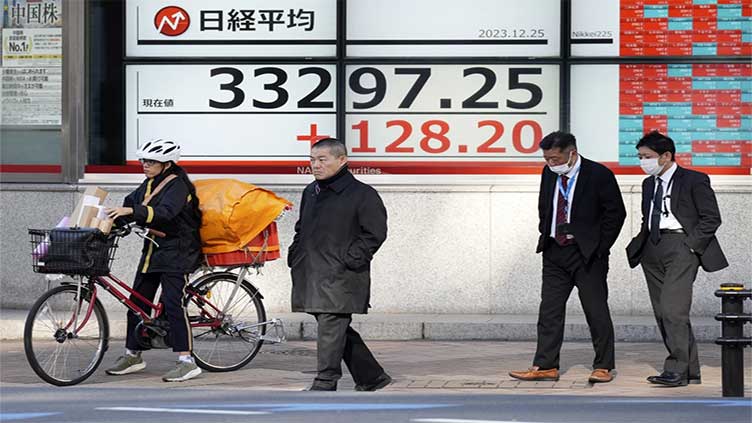Stock market today: Wall Street drifts near its record highs

Business
Stock market today: Wall Street drifts near its record highs
NEW YORK (AP) — U.S. stock indexes are drifting around their records as hopes hold that the economy can pull off the rare feat of getting painfully high inflation under control without a recession. The S&P 500 was up 0.2% in early trading Friday, a day after setting an all-time high for the 42nd time this year. The Dow Jones Industrial Average was up 122 points, or 0.3%, and the Nasdaq composite rose 0.2%. Treasury yields eased in the bond market after a report showed that the Federal Reserve’s preferred measure of inflation slowed in August by a touch more than economists expected.
Premarket trading on Wall Street was relatively listless Friday ahead of the government’s latest inflation report.
Futures for the S&P 500 and the Dow Jones Industrial Average were essentially unchanged less than two hours before the opening bell, hovering around recent record highs.
Friday’s consumer spending report, which also contains the Federal Reserve’s preferred measure of inflation, may not have the impact on markets that it used to after the U.S. central bank issued its first interest rate cut in four years last week.
The Fed has acknowledged to some degree that its primary focus has shifted from fighting inflation to supporting the broader economy, in particular, a cooling labor market. While the labor market remains broadly healthy, there have been signs of softening in recent months.
Fed officials are trying to pull off the historically difficult task of suppressing inflation without tipping the economy into a recession. The first part of that has largely been accomplished. Whether they can pull off the second part of that goal remains to be seen.
It was quiet on the corporate news front early Friday with earnings season mostly wrapped up.
Costco dipped a modest 1% after the bulk grocery warehouse club reported a modest fourth-quarter profit but fell short of Wall Street’s sales targets.
In other dealings early Friday, benchmark U.S. crude oil picked up 30 cents to $67.97 per barrel. Brent crude, the international standard, added 22 cents to $71.31 per barrel.
Despite Friday’s modest gain, oil prices are down more than 4% for the week and are on track to finish the month the in red for the fifth time in six months.
In Asia, Tokyo’s Nikkei 225 index gained more than 2.3% to 39,829.56 as ruling party lawmakers chose former Defense Minister Shigeru Ishiba to become Japan’s next prime minister. Ishiba, who will take over from Prime Minister Fumio Kishida next week, has proposed an Asian version of the NATO military alliance and a more equal Japan-U.S. security alliance.
The change at the helm was not expected to result in any major policy shift given that the ruling Liberal Democrats have held power for most of the past eight decades since World War II.
The yen also surged, as the U.S. dollar fell to 143.03 Japanese yen from 144.80 yen.
China’s central bank cut its reserve requirement for banks as of Friday as part of measures announced this week to help the property industry and support financial markets.
The Hang Seng in Hong Kong advanced 3.6% to 20,632.30 and the Shanghai Composite index jumped 2.9% to 3,087.53.
Earlier Friday, the Shanghai Stock Exchange encountered glitches that hindered order processing and caused delays after the market opened. This led to a 6.7% increase in Shenzhen’s main index, as investors flocked into that smaller market during the delay.
Trading returned to normal by noon, and the Shanghai Stock Exchange later said in a statement that it was still investigating the cause.
In the latest sign of the malaise hindering growth in the world’s second-largest economy, the government reported that industrial profits fell nearly 18% year-on-year in August.
Shares of Hong Kong’s property giant New World Development surged 19.4% on Friday trading after Adrian Cheng, the third-generation scion at the helm of the conglomerate, had been replaced. The firm reported an annual loss of over $2.4 billion in a profit warning last month, its first loss in nearly 20 years.
Australia’s S&P/ASX 200 added nearly 0.1% to 8,212.20, while South Korea’s Kospi lost 0.8% to 2,649.78.
Elsewhere, in Europe at midday the CAC 40 in Paris rose 0.3% after France’s preliminary inflation rate fell sharply in September as the consumer price index rose 1.5% year-on-year in August, down from 2.2% in the previous month, according to official data.
Germany’s DAX gained 0.9% and London’s FTSE 100 rose 0.4%.
The euro was trading at $1.1162 down slightly from $1.1176.
On Thursday, the S&P 500 added 0.4% to 5,745.37, setting an all-time high for the third time this week and the 42nd time this year. The Dow Jones Industrial Average gained 0.6% to 42,175.11, while the Nasdaq composite rose 0.6% to 18,190.29.


